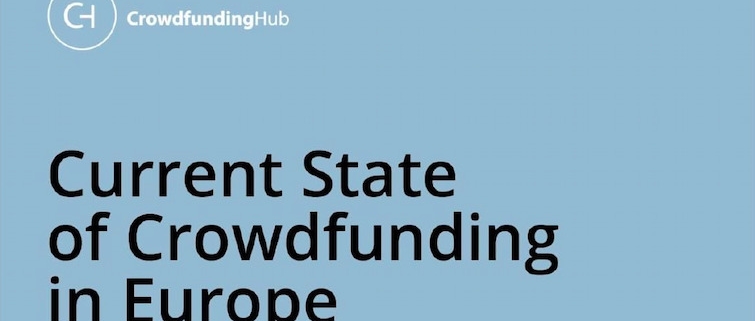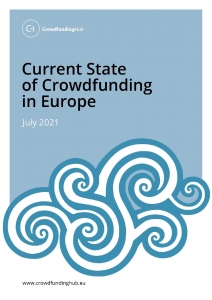Current State of Crowdfunding in Europe 2021
The current state of Crowdfunding in Europe
What is the current state of crowdfunding in Europe? This year, based on the crowdfunding market performance in 2020, CrowdfundingHub has carried out a research, concentrating on the analysis and the information regrouping of six representative European countries: France, Italy, Netherlands, Norway, Germany, UK. Also, this report shares insights of experts from six other European countries (Spain, Finland, Malta, Portugal, Hungary and Denmark).
In this report, we also address several special focuses that concentrate on the implementation of the Regulation on European Crowdfunding Service Providers (ECSP) and the impacts of COVID-19 on European crowdfunding markets.
The Implementation of ECSP
One of the big challenges of the European crowdfunding market is cross-border equity-based and lending-based crowdfunding. Adopted in 2020, the Regulation on European crowdfunding service providers for business (ECSP, 2020/1503/EU) will create a harmonized regime for most financial-return crowdfunding platforms providing access to finance for businesses.
For the first time, companies have the possibility to reach out to potential investors in all member states of the European Union. They can use transferable securities, loans or instruments comparable to shares of limited companies to attract investors, and raise up to €5 million per year through Crowdfunding.
In the next 5 years, the ECSP regulation will not only foster the development of crowdfunding in more countries in Europe, but also ensure that crowdfunding is integrated as a key component in the European Capital Market Union. This will boost the collaboration between public authorities and crowdfunding platforms for match-funding models. It will also enable private and public funds, including European Structural Funds to be distributed through crowdfunding platforms.
Impacts of COVID-19 on Crowdfunding
Many companies have had difficult moments during the global pandemic in 2020, however, we found out that the crowdfunding industry was very agile – it has swiftly implemented new business models and provided additional support and flexibility for the projects and companies that it supported. Despite the negative impacts caused by the global pandemic in 2020, many European countries have seen an increase in crowdfunding market volume.
It is also worth noting that reward and donation-based crowdfunding experienced a huge increase during the COVID-19 crisis. Most of the donations were made to support those who were impacted by the pandemic. Thus, reward and donation-based crowdfunding is expected to continue its growth in the upcoming years.
A Word from the Chairman
 “When we published our first report on the Current State of Crowdfunding in Europe 5 years ago, we already predicted that this industry would not develop at the same speed in different parts of Europe. Based on our “Maturity Index”, we identified the different preconditions which are needed to develop a more mature industry.
“When we published our first report on the Current State of Crowdfunding in Europe 5 years ago, we already predicted that this industry would not develop at the same speed in different parts of Europe. Based on our “Maturity Index”, we identified the different preconditions which are needed to develop a more mature industry.
With the aim of re-identifying the current situation in Europe, we reached out to our international partners in the Altfinator Policy Network and worked together with our academic partners at the Cambridge Centre for Alternative Finance and the European Centre for Alternative Finance to provide in-depth insights on the Current State of Crowdfunding in Europe in 2020.
I am really looking forward to the growth of the crowdfunding industry in the next 5 years and I am excited to see what the industry will have accomplished when we publish our report in 2025.”
——— Ronald Kleverlaan, Chairman of CrowdfundingHub
Authors of the Report
Ronald Kleverlaan
Ronald Kleverlaan is a thought leader on Community and Alternative Finance in Europe. He is the founder and senior partner at CrowdfundingHub. He is appointed as Director of the European Centre for Alternative Finance, an academic research centre of Utrecht University with a multi-disciplinary approach (finance, entrepreneurship, law, sociology) to research the potential of Alternative Finance. His speciality and academic interest is in community finance and community ownership. He is involved in a number of European consulting projects, was co-founder of the European Crowdfunding Network and member of the advisory board of several industry associations in Europe, China, Africa and USA.
Karsten Wenzlaff
Karsten Wenzlaff is Secretary-General of the German Crowdfunding Association and co-founded the AltFinator Policy Network together with Ronald Kleverlaan. He was a member of the European Crowdfunding Stakeholder Forum of the European Commission and has collaborated closely with Crowdfunding Associations all over Europe to shape the new European Crowdfunding Regulation. He is Researcher at the University of Hamburg, Research Affiliate at the European Alternative Finance Center at the University of Utrecht and Research Affiliate at the Centre for Alternative Finance at the Judge Business School of the University of Cambridge. He has been asked several times to comment on Crowdfunding and Fintech Legislation in the Finance and Digital Affairs committee of the German Parliament. He owns the Crowdfunding Consultant Firm ikosom.
Yunuo Zhao
Yunuo Zhao is a research and communication specialist at CrowdfundingHub. She has a unique perspective in international finance, financial services and alternative finance and works closely with European AltFin experts. She is also in charge of CrowdfundingHub’s website and social media network and actively participates in communicational activities of numerous European Commission projects such as HUB-IN, ENTRANCE, Altfinator and DivAirCity.
Pieter van de Glind
Pieter van de Glind is a senior advisor at CrowdfundingHub and co-founder of the Sharing Cities Alliance. He has a decade of professional experience in the sharing economy and urban development. Pieter authored several publications and gave more than 250 keynotes in more than 25 countries. His deep knowledge on sharing, digital platforms and new financial models empowers communities, business and governments to move forward on their goals. Currently he is applying community finance models to a dozen cities from around the world to boost sustainable and inclusive urban regeneration and to Europe’s transportation and mobility sector, to accelerate the uptake of sustainable solutions.
Download the Current State of Crowdfunding in Europe 2021 Report HERE









